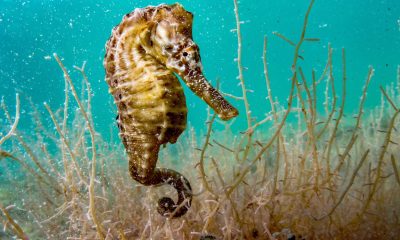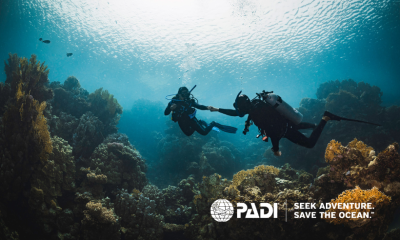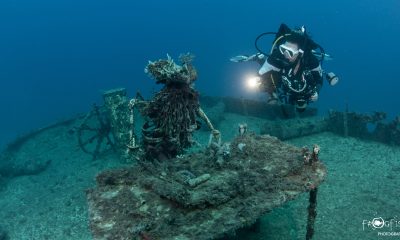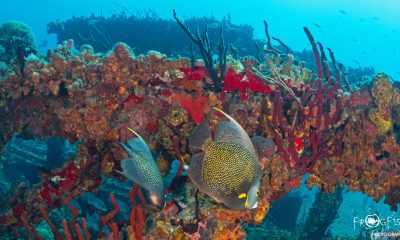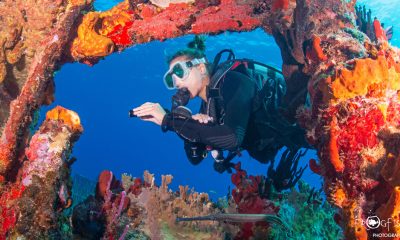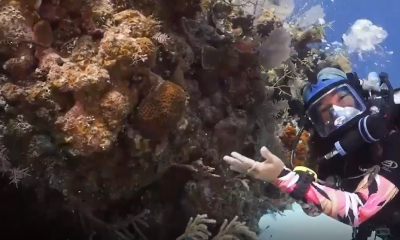News
OCEAN HEROES: Jamal A. Galves (Manateeman)
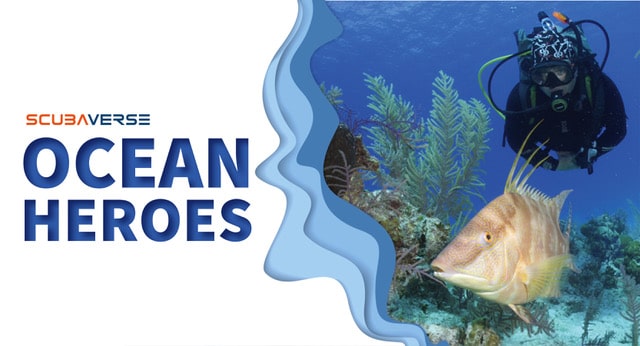
Our new series, Ocean Heroes, showcases the fantastic marine conservation work done by individuals and groups around the world. In this edition we talk to Jamal A. Galves, also known as Manateeman.
 Jamal is from Belize, specifically a small coastal village outside of Belize City named Gales Point Manatee where he grew up. He went to school at St John’s Junior College & then went on to study at the University of Belize.
Jamal is from Belize, specifically a small coastal village outside of Belize City named Gales Point Manatee where he grew up. He went to school at St John’s Junior College & then went on to study at the University of Belize.
Caroline: How did you get involved with marine conservation?
Jamal: I have always been fascinated by manatees. As a young boy, I would stand on my grandparents’ lawn in Gales Point Manatee and observe manatees swim through the lagoon. I would spend long hours sitting on the dock, dreaming of one day being able to work with the gentle herbivores. At the age of 12 this dream became a reality.
I caught the attention of a field research team, led by renowned manatee conservationist Dr. James “Buddy” Powell, that visited my village every year to study manatees. The team noticed how enthusiastic I was about manatees and brought me along on their boat to observe. That one trip out resulted in me coming back day after day, eager to learn more and help wherever I could.
I have volunteered with the team since then and my dedication and commitment has only increased resulting in becoming a member of the team at age 16. Today I am the coordinator of the Belize Manatee Project Program for the Clearwater Marine Aquarium Research Institute, an organization that works to protect and conserve coastal ecosystems and species. Though I have had a fair amount of success I have seen the impact these animals faced due to human negligence and that continues to drive me to ensure these animals are protected
Though manatees are currently endangered, I am hopeful about the species’ survival. “As a child I never would have thought manatees would be endangered. However, I am very optimistic about their future. Otherwise, I wouldn’t do what I do.”
Ultimately, I wish to inspire the next generation through my efforts. “I believe that when young people decide to save a threatened species, it’s inspirational. That inspiration can be contagious and provide encouragement to others”. That is exactly what happened to me, Jamal, the boy who saves manatees.
Caroline: Tell us about the Belize Manatee Conservation Program
Jamal: In 1997, Dr. James “Buddy” Powell, Bob Bonde of USGS, Nicole Auil of the Belize Coastal Zone Management Authority and a Sea to Shore (now CMA Research Institute) associate research scientist, began the Belize Manatee Conservation Project.
Belize has the highest known density of Antillean manatees, a subspecies of the West Indian manatee, in the world. Unfortunately, because of rapidly increasing coastal development, human-related manatee deaths are rising quickly. Poaching, once the major threat to manatees in Belize, has been replaced by boat kills and destruction of habitat as the major concerns for the survival of the species.
CMA Research Institute scientists and collaborators provide the data, expertise and scientific exchange that are used by the Belize government to establish sanctuaries, speed zones, laws and regulations that safeguards manatees and other actions that help ensure the survival of manatees in this remarkable country.
I was just a boy at age eleven when I met Buddy at the dock preparing to head out for manatee health assessments. I asked if I could join the team and began volunteering in efforts to protect the manatee of Belize. After years of expressing his devotion, interest and passion for the conservation of the endangered manatees, I was officially hired as a Field Assistant in 2008. Today, I am the Belize Manatee Conservation program coordinator.
Program Activities
- Conduct countrywide community-related education and outreach programs coordinate the Belize Marine Mammal Stranding Network.
- Serve as a resource and representative on relevant government and local committees, such as the Belize Manatee working group.
- Track and monitor tagged, wild manatees.
- Create public information brochures and posters on manatees and their habitat.
- Communicate with the media and the public on manatee conservation issues.
- Continue critical fundraising efforts for our programs and handle all aspects of managing, administering, and maintaining an active research and conservation program in Belize.
Examples of Program Success
- Speed Reduction and No-Wake Zones
Implemented speed zones and installed and maintain no-wake zone signage in the waters off Belize City.
- Decreased Poaching
Through research and awareness efforts we have decreased poaching incidents in the country. In 2010 a poaching incident in Belize was prosecuted. This is the first time anyone has been prosecuted for killing a manatee in Belize.
- Population Monitoring
We have successfully captured and carried out health assessments on 164 individuals since 1997. The data set we have gathered over the years through consistent health assessments of this wild population is helping to provide vital information on the population’s status, and what measures and efforts still need to be taken to ensure manatees continue to exist.
- Rescue, Rehab, and Release
Our Belize team has successfully rescued and transported many injured, sick or orphaned manatees to a rehabilitation facility for care, and have reintroduced and monitored those animals in the wild following recovery
Caroline: What is so special about manatees?
Jamal: They are the only herbivorous mammals in Belize’s water ways and Belize has the last strong-hold on the population throughout its range. Manatees provides critical role within Belize’s marine ecosystem as they are considered nutrients recyclers as they consume about 10% of their body weight daily which then turns to excretion that acts as nourishment for small fishes and crustaceans. I have to mention that they are very gentle, charismatic and cute.
Caroline: What success stories have you had? Can you tell us more about the baby manatee you recently rescued?
Jamal: On July 13 2020 I, Associate Research Biologist, and a team of volunteers from the Clearwater Marine Aquarium Research Institute, rescued a male orphan manatee calf in Belize that is estimated to be two to four weeks old. The calf was observed the previous day alone and showing signs of distressed. The baby manatee was later taken to the rehabilitation centre, to receive around-the-clock care. The young male was only 36 lbs when it came in and has shown great signs so far. He will spend the next 3-4 years in rehab until he is fit and ready to be returned into the wild.
Watch the rescue video here:
Caroline: What is the biggest threat to manatees in Belize?
Jamal: Watercraft collision, entanglement, habitat destruction, pollution and poaching
Caroline: If you could persuade people to change their lives in one way, what would you ask them to change?
Jamal: I would ask them to change their appreciation and kindness for the environment and all wildlife. As by simply changing that and having an appreciation for those things one will naturally change other behaviours that impact both the environment and wildlife and will realize by doing so it also benefits human livelihoods.
CRB: Where can our readers find out more about the work that you do?
Keep up with Jamal Galves’ work with manatees on Instagram and Facebook.
Learn more about The Clearwater Marine Aquarium Research Institute by clicking here, or by following them on Instagram here.
News
Seahorse National Park announced on Eleuthera in The Bahamas
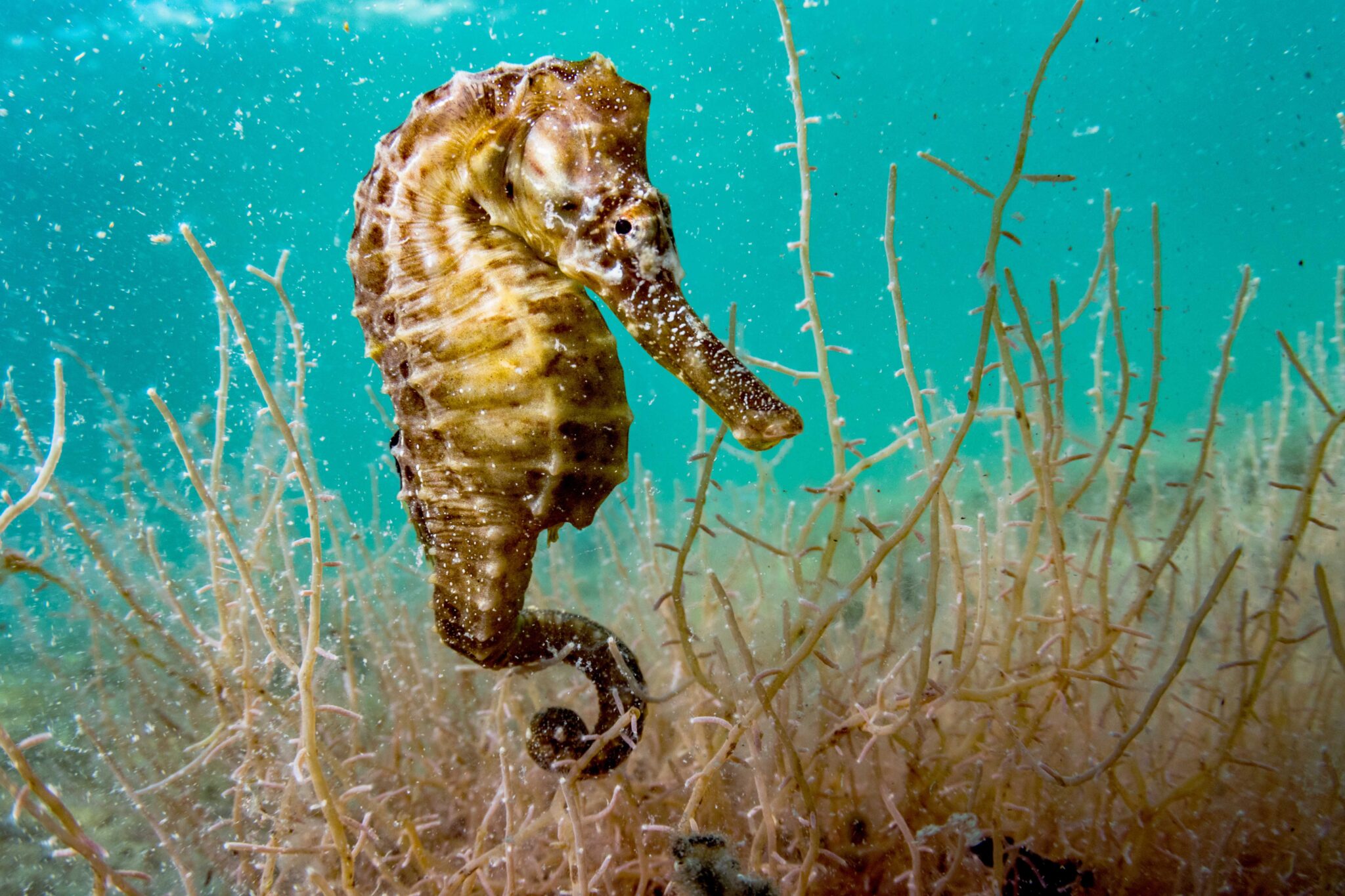
This week has seen the announcement of the designation of Seahorse National Park at Hatchet Bay Cave and Sweetings Pond on Eleuthera. This monumental announcement comes after years of efforts from the BNT and its partners in advocating for the protection of Sweetings Pond and its surrounding areas as an official national park under the BNT’s management.
Sweetings Pond is a large, land-locked saltwater pond in Hatchet Bay, Eleuthera. It has many unique natural features, but the most notable of them all is its incredible seahorse population, which is believed to be the densest population of seahorses in the world. The new 548-acre national park protects the entire one-mile-long pond and the surrounding terrestrial area. The land surrounding Sweetings Pond is a blend of intact coppice, mangroves, and farmlands. In addition, the new national park includes the extensive Hatchet Bay Caves system. This historic cave system is a popular attraction and contains a number of impressive geological features. It is one of the longest dry cave systems in The Bahamas.
Since 2014, the BNT has been leading efforts to have the area declared as a national park. This included years of public outreach and stakeholder consultations in communities across Eleuthera; education presentations in local schools; science and research efforts; and engaging consecutive government administrations. In 2018, the BNT submitted the “20 by 20 Marine Protection Plan” to the government, which included the recommendation to declare Sweetings Pond and other areas in The Bahamas as protected areas.
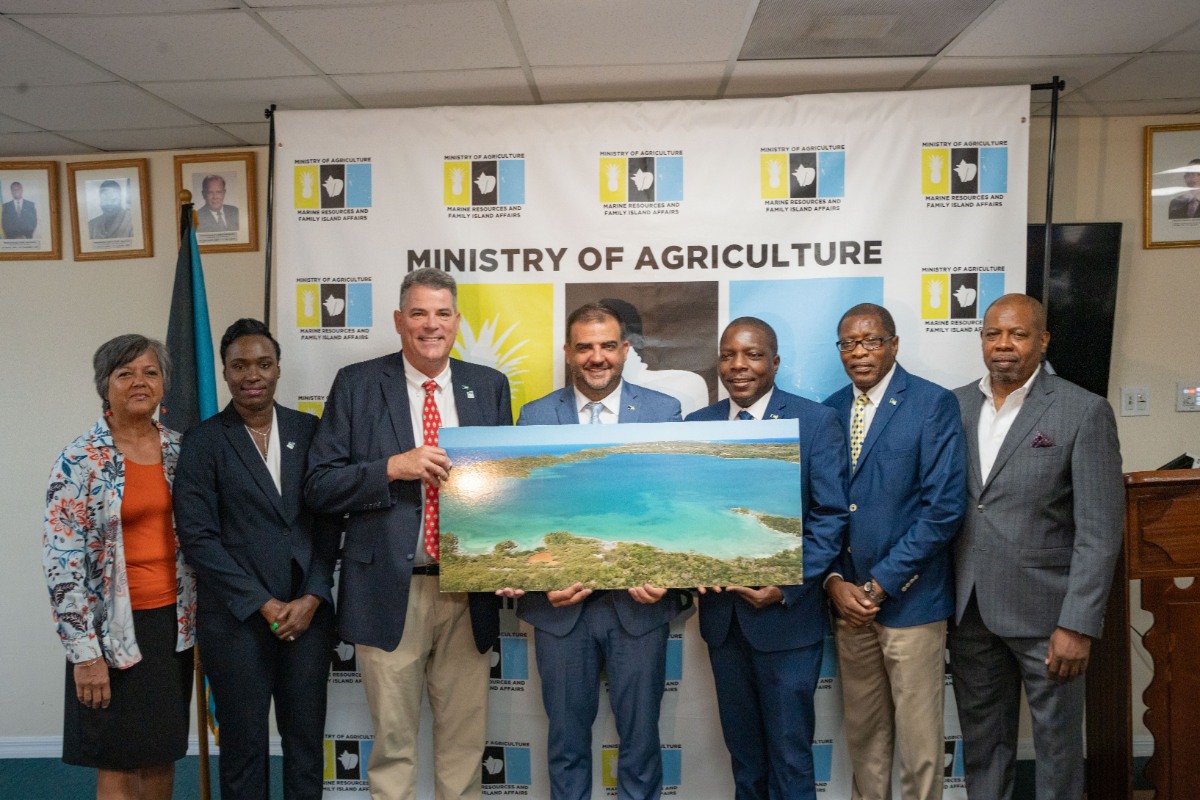
During the lease signing ceremony for Seahorse National Park, Minister Clay Sweeting, said, “This lease agreement for Sweetings Pond has been a long time coming. It represents a milestone in our journey towards sustainable development. It symbolises our collective responsibility to safeguard our natural heritage and create a harmonious relationship between economic progress and environmental preservation.
“I would like to express my gratitude to all stakeholders in this process of drafting and finalising this lease agreement. Their dedication, expertise, and commitment has been crucial in ensuring that this agreement falls in line with our vision of creating a thriving ecosystem while promoting responsible usage. Let us continue to preserve the jewel that is Sweetings Pond for many generations to come.”
The BNT invites the public to stay tuned for more news about its plan for the country’s newest national park: Seahorse National Park at Hatchet Bay Cave and Sweetings Pond!
To learn more about the role the BNT plays in managing terrestrial and marine national parks, conserving wildlife, and informing environmental policy, please visit its website: www.bnt.bs
Follow/subscribe to its various social media channels: Facebook, Instagram, Twitter, and YouTube.
Banner Image: A lined seahorse (Hippocampus erectus), female, clining to algae in an alkaline pond in The Bahamas by Shane Gross
News
PADI Club invites Ocean Lovers on exclusive dive trip to Bonaire this September
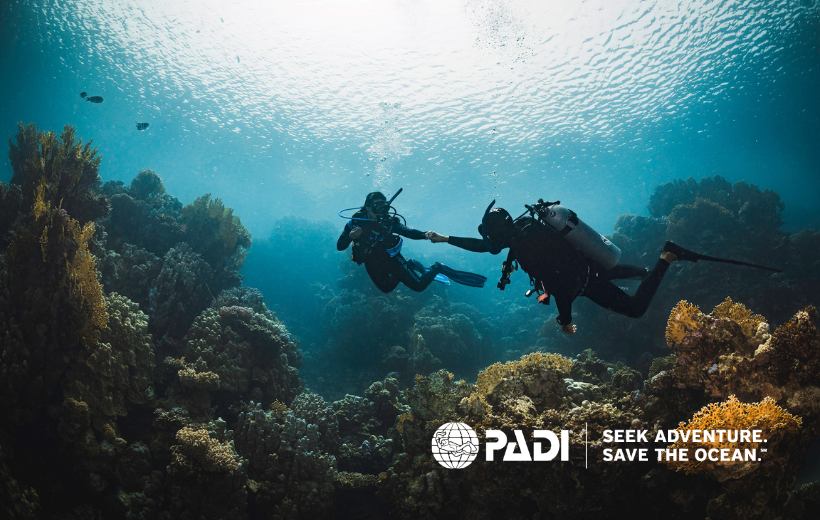
Following the popularity of the PADI Club trip to Belize at the end of July, a second “dive trip of a lifetime” has just been announced by PADI Club to Bonaire this September 23-30, 2023.
Offered exclusively for PADI Club members as part of their yearly benefits, attendees will get to seek adventure while staying at the all-inclusive Buddy Dive Resort, one of PADI’s premier members on the island. Other PADI Members in Bonaire – including Toucan Divers, Divi Flamingo, Wanna Dive, Dive Friends and Scuba Do – will also be hosting various dive experiences throughout the week.
“Bonaire is a unique and beautiful gem in the Dutch Caribbean and we want to show our Club Members this little island looms large as a dive destination,” says Zach Pavkov, PADI Club Operations Manager. “This trip offers participants a chance to not only explore a world-class diving destination but do so through some of the very best PADI Operators.”
PADI Club members will receive a generous discount for this seven-day diving adventure, with packages starting at $1,739 per diver for double occupancy.
Included in the package are:
- social events that include hosted dinners, cocktail parties and live music
- transportation in Buddy Dive Resort’s famous pick-up truck
- daily shore diving and boat diving
- accommodation, with the option to share a room with another solo diver or rent out one, two and three-bedroom apartments to host larger groups of divers
- surface interval activities that include PADI Seminars and island excursions like hiking and bird-watching.
“Because the water surrounding Bonaire has been an established marine park for 44 years, Bonaire is now a top-ranked destination with abundant marine life that includes scorpionfish, flounder and frogfish, moray eels, hawksbill turtles and eagle rays, ” continues Pavkov.
With limited spots available, the list of participants will be decided on a first-come, first-served basis. Those who are not yet PADI Club Members but are interested in joining the trip can sign-up, which will also give them access to:
- 20% of PADI eLearning® programs and PADI Gear™
- a free ReActivate® online refresher
- a free DAN® Prepared Diver course
- a subscription to Scuba Diving® magazine
- access to the PADI Club Celebrity Speaker Series webinars
- brand partner benefits from GoPro, Uber, Salt Life and more
To further support ocean lovers to create positive ocean change, five percent of the PADI Club membership fee will go towards supporting conservation efforts around the globe.
“PADI Club benefits are designed not just to empower divers to explore the ocean, but also enable them to play a pivotal role in saving the ocean too,” says Pavkov. “This year’s additional expedition to Bonaire gives our community the chance to come together and explore our shared blue planet in a truly meaningful and connected way.”
Click here to sign up for PADI Club and reserve your spot here to join the Bonaire dive trip.






